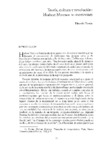Teoría, cultura y revolución: Herbet Marcuse in memoriam

View/
Use this link to cite
http://hdl.handle.net/2183/2695Collections
Metadata
Show full item recordTitle
Teoría, cultura y revolución: Herbet Marcuse in memoriamAuthor(s)
Date
1997Citation
Sociológica. Revista de pensamiento social, 1997, 2: 133-160. ISSN: 1137-1234
Abstract
[Abstract] The paper sets Marcuse's theory of culture and its implications for a radical con..
ception of education in the context of the Frankfurtian version of Western
Marxism, the socioeconomic environment of postindustrial capitalism emerged at
the end of World War 11 and the social luovements arisen in the late sixties.
Starting from the main thesis about the totalitarian. character of late capitalism, special attention is paid to Marcuse's overcoming of Adonlo and Horkheimer's pes-SitUiS1U.
The paper also emphasizes how Marcuse's hope on the utopian energy of
students and youth can be considered as the last moment in which Western
Marxisll1 tried to develop close to a revolutionary subject. [Resumen] El artículo analiza la teoría de la cultura de Marcuse y sus implicaciones para una
concepción radical de la educación en un triple contexto: el del marxismo de la
Escuela de Frankfurt, el del capitalismo postindustrial surgido tras la 11 Guerra
Mundial y el de los luovimientos sociales de los últÍluos años sesenta. A partir de la
tesis gen.eral acerca de la naturaleza totalitaria del capitalisn10 tardío, se presta una
atención especial a la forma en que Marcuse trascendió el pesimismo característico
de Adorno y Horkheimer. El artículo subraya, en este sentido, hasta qué punto la
esperanza marcusiana en la energía utópica de los estudiantes y de la juventud
puede ser considerada como el último momento en que la tradición del marxiS1UO
occidental intentó crecer en conexión con un sujeto revolucionario.
ISSN
1137-1234





